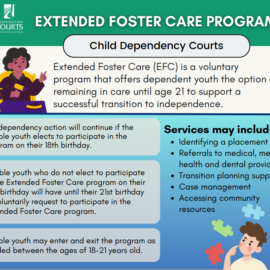Filed September 18, 2023 Court of Appeals, Div I: Regarding legal standards and evidence at termination of parental rights trials, including the right of a minor child to file a motion to intervene in a case involving a younger sibling.
In the Matter of the Dependency of G.C.B. and M.J.B.-L.
Filed September 11, 2023 Court of Appeals, Div I: Addresses issues of evidence and waiver of right to counsel in termination trials.
In the Matter of the Welfare of C.W.M.
Filed August 15, 2023 Court of Appeals, Div II: Addresses whether the Department is required to show reasonable efforts prior to entering a dependency order.
3rd Annual Washington All Sites Meeting
2023 All Sites
You can access the web page for our meeting here: https://www.wacita.org/3rd-annual-washington-all-sites-meeting/
PowerPoint Download
Extended Foster Care Program Infographic
In the Matter of the Dependency of R.D.
Filed July 11, 2023 Court of Appeals, Div III: Regarding standard of “active efforts” to prevent the breakup of an Indian family.
In the Matter of the Welfare of D.H. and A.K.
Filed January 24, 2023 Court of Appeals, Div II: Addresses what is sufficient evidence for the termination of parental rights of a parent with an intellectual disability.
In the Matter of the Dependency of L.C.S.
Filed August 11, 2022 Provides guidance to assist courts in applying the reasonable efforts standard given the lack of decisions in our state defining the term.






